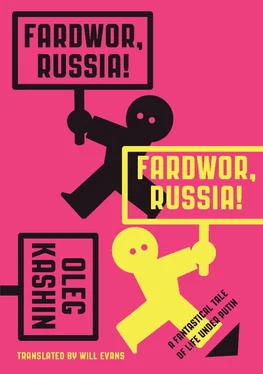Marina was all too happy that they got out of there so quickly—while Karpov had been chatting with Elena Nikolaevna, she had been accosted by some agronomist lady who was for some reason particularly interested in whether Karpov was a faithful husband. Marina answered that yes, he was, but the woman’s obtrusiveness had spoiled her mood.
KARPOV KEPT DISAPPEARING into his shack from morning to night, and Marina had already gotten used to having no entertainment except for television and the Internet (yes, she herself had called the cable guy, who had come from a local provider and set up cable internet in their apartment), since it didn’t look like any more options were about to become available. But one day Karpov came in from the shack around 5:00 p.m. in an excessively good mood and bearing a bottle of champagne. Marina immediately knew that something important and good had happened and, hopefully, since this important and good thing had happened, they could finally return to Moscow and Karpov would become rich and famous, and she would be the wife of “the one and only Karpov,” which suited her just fine; for as had been written, “The great man stared through the window, but her entire world ended with the border of his broad Greek tunic.”
But it turned out that all the fuss just about some small victory that didn’t affect Marina’s life at all—Karpov had finally managed to regulate his serum so that once his test rats reached adult size they would stop growing before they turned into enormous monsters.
“What now?” Marina asked.
“Now…” her husband paused in thought. “Now I need a midget.”
Of course, experiments on people in Russia are forbidden by law, as in any civilized country, but Karpov didn’t see this as an obstacle to performing a miracle, and turning a midget into a normally-sized person, of course, can be considered a real miracle, and as long as Marina didn’t rat out Karpov to the cops, then she needn’t be afraid of anything—no one would find out how the test midget grew, and the midget himself would be happy. They got online and started scouring the Internet for midgets, and within a minute, on some local message-board for young parents, they found a fascinating discussion about a new show at the city circus—all those young parents without exception advised one another not to bring their children to this new show under any circumstances, because there was no spectacle more sad and boring. The clowns weren’t funny, the trained cows and cats were boring, and most shameful of all was the midget Vasya, who did impersonations of popular Norwegian singer Alexander Rybak, but the way he performed them made you wish he’d never done them in the first place.
Karpov immediately called the circus and found out that the next show would take place the next day.
“Shall we go meet Vasya?” he asked Marina. Marina kissed her husband—she had wanted to go to the city with Karpov for some fun for some time now.
THEY MADE A POINT of coming to the city early to have dinner in a restaurant and stroll along the boulevard before the show. Karpov brought his wife to the tin Red Army soldier again, but this time its shape didn’t impress Marina at all; it was just a statue like any other. She had been in a bad mood pretty much all day, and she knew why: when Karpov spoke, what he said seemed logical and proper to her, but when he was silent, and she allowed herself to think about it, then all her husband’s ingenious ideas started to seem if not dubious, then at least peculiar. An experiment on a living person—what if it goes wrong; what if the midget grows into a twenty-meter giant and destroys the city; and what if Karpov gets thrown in jail? Or even without the giant, what if the midget is insulted by Karpov’s dangerous proposal, and he calls the cops and Karpov gets into some kind of mess?
Going to the circus itself, however, was one big mess—quality obviously did not appear to be a priority for the circus, and Marina even asked Karpov to let her go somewhere and wait for him on neutral territory. Karpov didn’t mind, and Marina probably would have even gone, but she suddenly felt sorry for her husband. She stayed and watched as a hung-over clown in the ring hit a cow on the horns with a balloon hammer, while the cow, advertised on the circus poster as an erudite animal in the sense that it could count, mournfully mooed as many times as the hammer hit her horns. Then some Krasnolozhkin performed—on the posters he was advertised as a student of the great cat-trainer Yuri Kuklachev and, probably, he really was, because this Krasnolozhkin’s skinny cats so desperately tried to act like trained ones, and they were so pitiful that Marina probably would have again asked to go to some café if Karpov hadn’t looked so pleadingly—he himself, of course, shared his wife’s feelings for the circus, but unlike her, he was prepared to do anything just to make it to the moment the midget Vasya would come out.
Vasya, when he appeared, did not deviate from the show’s general format—he was a bit cuter than the cats and a bit more pathetic than the cow. In contrast to the animals, however, he was his own trainer and master of ceremonies—he galloped on a pony, shot a miniature gun at plates thrown into the air by an assistant (twice, of course, he missed), but then jumped with surprising grace from his little pony, pulled out of somewhere a tiny, probably plastic, violin, and, accompanying himself, began to sing in a horrid child’s voice: “Years ago, when I was younger, I kinda liked a girl I knew, she was mine and we were sweethearts, that was then but then it’s true.” If Marina found out that the lyrics had been written by Vasya himself she wouldn’t have been surprised—the midget himself and his violin, along with his voice and the song, came together remarkably well as a cohesive composition—and it was simply impossible to determine which of those distinct parts was the most offensive.
Marina glanced over at her husband—Karpov looked like the happiest man on Earth. Obviously if he could, he would have been happy to gobble this little Vasya up whole, but since Karpov’s range of morally acceptable activities didn’t include cannibalism, he limited himself to passing a note to the midget through a manager. It read something like, “Blah blah blah, I’m Karpov from Moscow, I would like to talk to you about a very important matter, I’m waiting for you in such and such coffee shop across the street from the circus.”
While they sat and waited for Vasya in the coffeeshop, Marina told Karpov several times that Vasya, of course, would not come, because being a midget in the circus not only entailed riding a pony around the arena, but also drinking oneself silly after the show, and if Karpov couldn’t understand that, then that was just proof of his ignorance. Karpov disagreed halfheartedly, but Marina saw that her husband was starting to get nervous again—the chances of not seeing Vasya were very high. And perhaps that’s why, when the midget did actually appear, Karpov’s face lit up with a degree of joy only possible for a twenty-nine-year-old married man without children and a proper job.
For his part, Vasya, as quickly became apparent, was for some reason certain that Karpov was not only from Moscow, but from the Nikulin Circus on Tsvetnoy Boulevard; and so, when it became apparent that no one was going to try to lure him to Moscow, the midget became bored and started to display a willingness to leave, especially since Karpov nearly ruined everything—without any preliminaries, he told the midget that he wanted to “make him a bit taller.” It’s well known that midgets are very sensitive to even the slightest joke about their anthropometrical statistics, and the fact that Vasya didn’t start a brawl with Karpov right away, if it meant anything, meant only that Vasya had some self-esteem issues. In any case, the conversation began to take on a hostile tone, and Marina realized that she needed to get involved. She took Vasya by the hand and very calmly began to explain to him that her husband didn’t mean any harm, and that though Marina herself didn’t understand how, he really was going to try to make Vasya taller.
Читать дальше




![Stephan Orth - Behind Putin's Curtain - Friendships and Misadventures Inside Russia [aka Couchsurfing in Russia]](/books/415210/stephan-orth-behind-putin-s-curtain-friendships-a-thumb.webp)






